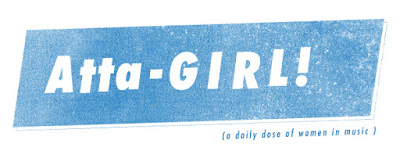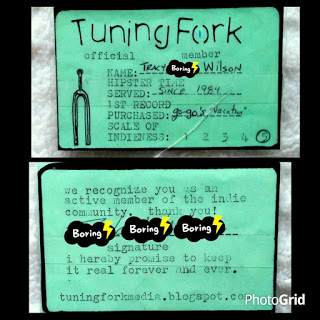October 28, 2015
Atta-GIRL! Blog
I recently started another blog to exclusively focus on women in music It is called Atta-GIRL! I personally find comfort and courage to forge ahead in music the more I learn about and meet other women in the industry. It can be lonely and scary to make your way in a place that is mostly made up of men. Atta-GIRL! will celebrate a different woman or group of women each day who either makes music or works behind the scenes in the music industry. Now there is a constant reminder of just how many of us there are or have come before us kicking ass and doing inspiring things. You could sort through a kagillion social media posts and websites to compile this list yourself for OR you could just sit back and let me do it for you.
October 14, 2015
How to Tune a Fork
Before Lightning’s Girl, I was pitchperfect. It was my nom de plume at Tuningforkmedia, a music blog I founded ten years ago. We were an anonymous, small group of people who blogged about all sorts of things but mostly we reviewed Pitchfork’s reviews. It began as a private joke among friends within the music industry but then our blog accidently snowballed into the very thing we cursed.
My Tuningforkmedia profile from almost exactly a decade ago lives here. To the left is a joke hand numbered membership card I created.
The idea started innocently enough. When my band Dahlia Seed broke up in 1996 I began working for one of the best indie music distributors in the world. I had been employed as a sales rep there for nearly nine years by 2005. I worked alongside some of the best, most well respected record labels known to man (all genres) and for this reason I had access to just about any new record independent music fans cared about as well as their artist bios and one sheets/ sell sheets that went along with them. It also meant that if I didn’t have some record I was interested in, I was friendly with someone (a fellow sales rep, record label owner, band, or record store buyer) who could send me a copy. I basically had access to any record I wanted to hear and before file sharing music was common, CDs could be mailed and in my hands within a few days. As a music fanatic, this was the best possible position to be in. I wasn’t paid particularly well for most of the 2000s but I was rich with music of all kinds.
The online music publication Pitchfork Media was and still is an undeniably important selling tool within the music industry. Their reviews can make or break the success of a release and in turn offices like ours were drowned in PFM references. Every label, band, PR company, or creative entity begs for Pitchfork's attention in hopes of that white whale of a perfect review or news coverage. To this day it is common that a new release sell sheet includes a quote of some kind from Pitchfork. The music industry has become obsessed with catching this publication’s attention and even if the review is brutally negative, Pitchfork still has more eyes on them that any other music site so even bad press is better than no press.
Within just a few years time Pitchfork Media grew to be a God and their highly rated records by artists like Arcade Fire, Clap Your Hands, Liars, Animal Collective, Kanye West became the gospel. I saw first hand how record sales were directly linked to the reviews found on their website. For those of us who worked on the industry side of music, it was impossible not to regard PFM as a seemingly unstoppable force. They were all everyone talked about and bowed down to. It was truly maddening. Our world’s focus became this singular Chicago based music publication and in turn Pitchfork's power became frightening and downright annoying.
This also made Pitchfork an easy target for those of us who were working with all the same music and also had the same promotional tools their writers were being sent. We could see behind Oz’s curtain and on most days, we cursed what we saw.
Among a very small group of friend’s it became a private game to pick apart Pitchfork's album reviews. We emailed each other these fake reviews or sizzling commentary. We knew which of their writers were borrowing bits from press kits, which writers were occasionally plagiarizing from the very same one sheets we had on our desks, and which writers had gotten their facts wrong. We lived and breathed these same records every day. It became all too tempting to place Pitchfork under scrutiny. You couldn’t ignore them. Our heads were bashed in with just how mighty their pens were. As the internet grew, as blogger templates appeared, it was really only a matter time that our private chiding went public. The transition was simple.
Tuningforkmedia was comprised of a very small group of unpaid writers and I use the term writers loosely. These were my good friends and none of us were professional music journalists (clearly if you read our posts). Tungingforkmedia was our home base to vent. Our identities remained top secret. We never promoted our site or accepted advertisements. It never really occurred to us that anyone else would want to read our ramblings however the word spread about our humble joke like wild fire. In hindsight of course it did. The Pitchfork backlash was growing at a rapid pace and music fans were quick to hate the thing so many others worshipped. The thing about indie music snobs is that we hate it when a thing we love becomes co-oped and popular. This once charming and beloved music site had grown to epic proportions and we were there nearly daily to slay that beast. Within just a few months we went from being an industry secret to having hundreds and then on good weeks, sometimes thousands of readers visiting our site. Gossip about our blog also spread very quickly among bands and record labels; the same ones who were dependent on PFM’s attention. They generously fed us music and press kits as if we were a serious music blog and sometimes even tipped us off on Pitchfork’s errors in hopes we would jump to their defense. There was also so few female writers in this world that I admittedly took great pleasure in bringing a woman’s voice to this massive boy’s club.
It was honestly an insanely time consuming effort to review one of Pitchfork’s reviews within 24 hours of them posting it but I was also an insomniac that worked from home. Since our group had access to all the same records Pitchfork covered it took very little effort to spit out a quick re-review. When you also consider that I professionally talked about these records daily with a large account base and often the Pitchfork reviews that went with them, my opinions and retorts to PFM’s posts were pouring out of my mouth in nearly real time, blog or no blog.
Thanks to newish technology at the time, we could share these ideas and discuss them in a conference like setting even though we were spread all over the U.S. With all the resources a music fan could ever want, we collectively could offer a tit for tat. We were not striving to be world class music journalists; we were openly having a piss. Pitchfork did what they do best, one of us would inevitably have something to say about it, and up went a post as quick as lightning. It went on this way for several years.
Tuningfork was a fun, ridiculous, venting mechanism for a few years but we were also all employed full time in a shrinking industry. Half of us traveled a great deal for work and on the whole we were busy people who had never intended on dedicating a few hours a day to some music site we had this indirect working relationship with. The more seriously people regarded our site, the less enjoyable and real work our silly blog felt. Our sarcasm and bite had hurt a few people’s feelings along the way and it was truly never our goal to torture their music writing team. Our joke stopped being fun/funny to us so we decided to pull the plug in 2007. Enough was enough.
In 2007 the masses had not rediscovered vinyl yet. CD sales were dwindling. Cassettes were dead. Digital music was the music industry's new best friend and enemy. We were in the early stages of understanding what digital content sharing would mean to people like us and how technology / music fans would embrace it. We were collectively scrambling to figure out just how many days were left in our numbered future. My particular job was quickly becoming obsolete and it was time to work on a plan B. I managed to bounce around physical music distribution for another 6 years but it never matched the golden age that I was fortunate enough to spend over 10+ years dedicated to. We were considered one of the best indie music distributors that ever existed and I was a part of it for a third of my adult life. Pitchfork may have helped sell records indirectly but I was a part of a lesser known team actually getting these same records into the hands of the people through record stores. It isn’t to say one side of the business was or is more important than another but in hindsight we really played a similar role to Pitchfork. We were both tastemakers constantly introducing the next big thing to others. Sometimes we got it right and sometimes we got it wrong. We helped shape trends and if there is one thing I can be certain of, we were all very passionate about music.
My name is Tracy and I am still a music addict.
Disclaimer: The company I worked for had no idea I was behind this and would have absolutely not have condoned it. Also 99% of the label and bands who messaged the blog with tips to post about had no idea TFM was someone /potentially a few people they had a working relationship with.
Labels:
2000s,
Indie Music,
Music Industry,
Pitchfork,
Pitchfork Media,
pitchperfect,
snark,
tuningforkmedia
Subscribe to:
Posts (Atom)

